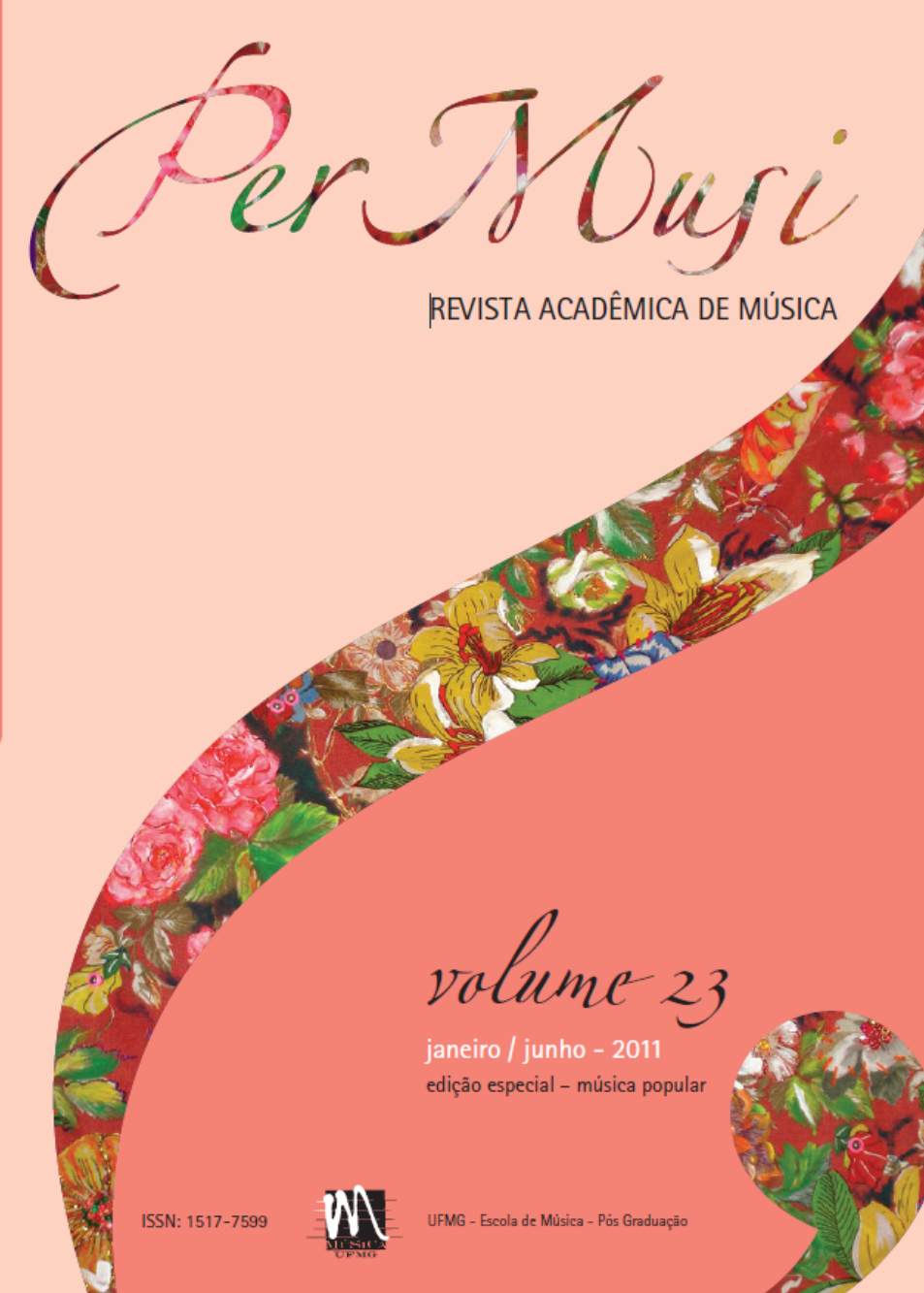The Roda de Choro musical and social analysis based on John Blacking ́s concept of musical order
Keywords:
Brazilian choro, Roda de choro, Ethnomusicology, John BlackingAbstract
The Roda de Choro offers a rich environment in order to analyze the musical context of performance and the social context which nourishes the musical relations. This article aims at analyzing the relationship of both musical and social contexts according to the concept of musical order established by John Blacking (1995), who argues that “music cannot exist without the perception of order that organizes sound”.
References
BÉHAGUE, Gerard. Performance Practice: Ethnomusicological Perspectives. Westport/London: Greenwood Press, 1984.
BLACKING, John. Music, Culture and Experience. Chicago: The University of Chicago Press, 1995.
CASCUDO, Câmara. Dicionário do Folclore Brasileiro. 11ª edição, São Paulo: Global Editora, 2002. 768 pp.
CAZES, Henrique. Choro: do quintal ao municipal. 3ª Edição, Rio de Janeiro: Ed. 34, 2005, 224 pp.
DAMATTA, Roberto. A casa e a rua. Rio de Janeiro: Ed. Rocco, 1997.
KERMAN, Joseph. O movimento da performance histórica. In: Musicologia. São Paulo: Martins Fontes, 1987. p.255-306.
KORMAN, Clifford. A Importância da Improvisação na História do Choro. In: Anais do V Congresso Latino Americano da Associação Internacional para o Estudo da Música Popular, Rio de Janeiro, 2004. [disponível em http://www.hist.puc.cl/iaspm/rio/Anais2004%20(PDF)/CliffKorman.pdf].
LIVINGSTON-ISENHOUR, Tamara E.; GARCIA, Thomas G. C. Choro. A Social History of a Brazilian Popular Music. Indianapolis: Indiana University Press, 2005, 254 pp.
MOURA, Roberto M. No princípio, era a Roda: um estudo sobre samba, partido alto e outros pagodes. Rio de Janeiro: Rocco, 2004. 318 pp.
PELLEGRINI, Remo T. Análise dos Acompanhamentos de Dino 7 Cordas em Samba e Choro. Dissertação de Mestrado, Universidade Estadual de Campinas – UNICAMP, 2005, 250 pp.
PINTO, Alexandre G. Choro: Reminiscências dos Chorões Antigos. Rio de Janeiro: Funarte, 1978.
QURESHI, Regula B.. Musical Sound e Contextual Input: A Perfomance Model for Musical Analysis. Ethnomusicology, 31:1, 56-86, 1987
REIS, Letícia V.S. O mundo de pernas para o ar: a capoeira no Brasil. São Paulo: Publisher, 1997.
SCHUTZ, Alfred. Making Music Together – A Study in Social Relationship.In: Dolgin, J.L. Kemnitzer, D.S & Schneider, D.M. (eds), Symbolic Anthropology – A Reader in the Study of Symbols and Meanings. New York: Columbia University Press, 106-119, 1977.
VIANNA, H. O Mistério do Samba. Rio de Janeiro: Jorge Zahar Editora, 1995. 193 pp.
VIEIRA, Luiz Renato e ASSUNÇÃO, Matthias Rohrig. Mitos, Controvérsias e Fatos: Construindo a História da Capoeira. In: Revista de Estudos Afro-Asiáticos n° 34. Rio de Janeiro: Universidade Cândido Mendes, 1998.
WEBER, Max. A Objetividade do conhecimento na Ciência Social e na Ciência Política. In: Metodologia das Ciências Sociais. 2ª ed., São Paulo: Editora Cortez, 1993.
Downloads
Published
Issue
Section
License

This work is licensed under a Creative Commons Attribution 4.0 International License.

Except where otherwise noted, contents on this site are licensed under a Creative Commons - Atribuição 4.0 Internacional.


